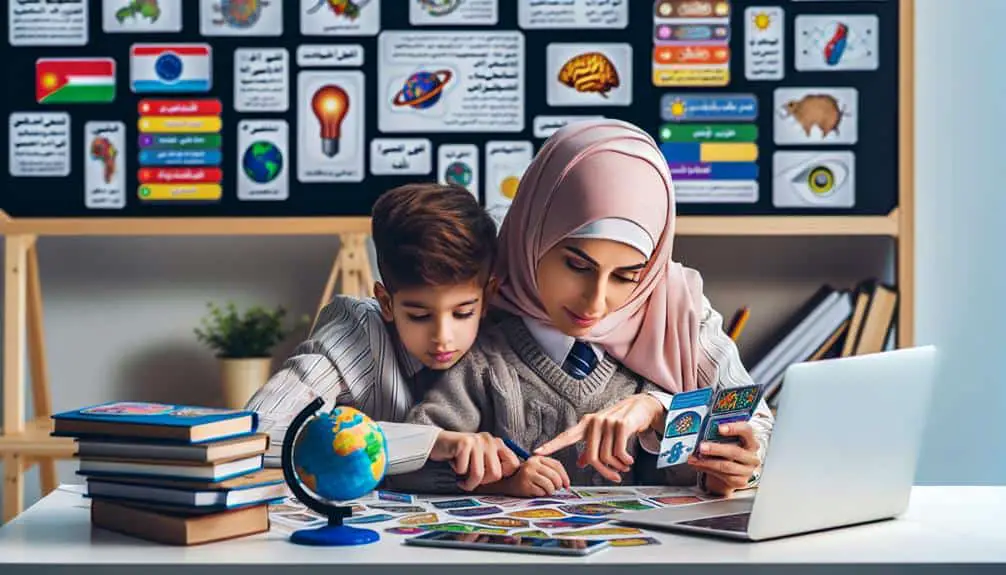Tailored technology can optimize homeschooling for diverse learning styles. Interactive whiteboards and videos benefit visual learners. Auditory learners thrive with podcasts and speech-to-text tools. Kinesthetic learners excel with hands-on simulations and games. Social learners engage on collaborative platforms. Solitary learners benefit from personalized feedback and adaptive lesson plans. Each learning style has tech solutions tailored for effective engagement and comprehension.
Key Points
- Interactive whiteboards for visual learners enhance hands-on learning experiences.
- Podcasts and audiobooks cater to auditory learners, improving comprehension through audio tools.
- Educational games and simulations support kinesthetic learners with interactive, tactile learning opportunities.
- Collaborative platforms engage social learners through teamwork and communication in virtual study groups.
- Personalized tech resources, like adaptive learning platforms, cater to solitary learners with customized lesson plans and self-paced learning options.
Visual Learners: Enhancing Education With Tech
Enhance your visual learning experience through the innovative integration of technology in your homeschool curriculum. Interactive videos and interactive whiteboards are powerful tools that can cater to the needs of visual learners. By incorporating interactive videos into your lessons, you can provide a dynamic and engaging way for your child to absorb information. These videos allow for a multi-sensory experience, combining audio and visual elements to enhance understanding and retention.
Interactive whiteboards, on the other hand, offer a hands-on approach to learning. They allow your child to interact directly with the material being presented, making the learning process more immersive and stimulating. With the ability to write, draw, and manipulate content on the board, your child can actively participate in the lesson, fostering a deeper level of comprehension.
Auditory Learners: Audio Tools for Success
To further optimize your homeschooling experience for auditory learners, explore the effectiveness of incorporating audio tools that cater to their learning style. Audio resources can be valuable learning aids for auditory learners, as they rely on listening and verbal instruction to grasp concepts effectively. By integrating podcasts, audiobooks, educational recordings, and speech-to-text software into your homeschool curriculum, you can create an immersive auditory learning environment that resonates with your child's preferences.
Utilizing audio tools not only enhances engagement but also improves retention and comprehension for auditory learners. Encourage your child to listen to educational podcasts related to their subjects of study, use audiobooks for literature assignments, and leverage speech-to-text software for writing tasks. These resources can help auditory learners absorb information more efficiently, reinforcing their understanding of various topics.
Kinesthetic Learners: Hands-On Tech Solutions
For kinesthetic learners seeking interactive learning experiences, incorporating hands-on tech solutions can greatly enhance comprehension and engagement in homeschooling. Interactive simulations and educational games offer a dynamic way for kinesthetic learners to interact with the material actively. These tools allow for exploration and experimentation, catering to the hands-on nature of kinesthetic learners. Tactile learning is further supported through the use of digital manipulatives, providing a physical interaction with abstract concepts that can deepen understanding.
By utilizing hands-on tech solutions, kinesthetic learners can grasp complex ideas through physical engagement, making learning more tangible and memorable. Educational games designed to encourage movement and participation can transform traditional subjects into interactive experiences that resonate with kinesthetic learners. Digital manipulatives offer a virtual way to manipulate objects and visualize concepts, appealing to the tactile learning style of these students.
Incorporating interactive simulations and digital manipulatives into homeschooling curriculum can create an immersive learning environment that caters to the unique needs of kinesthetic learners, fostering deeper comprehension and enjoyment of the material.
Social Learners: Collaborative Platforms for Engagement
Explore collaborative platforms as a dynamic tool for engaging social learners in interactive educational experiences. For students who thrive on interaction and group activities, incorporating technology that fosters collaboration can enhance their learning journey.
Here are four ways collaborative platforms can benefit social learners:
- Collaborative Forums: Utilize online forums or discussion boards where students can engage in conversations, share ideas, and collaborate on projects with their peers in a virtual setting.
- Interactive Projects: Encourage group projects that require students to work together using digital tools such as Google Docs, Padlet, or Trello to promote teamwork and communication skills.
- Virtual Study Groups: Facilitate virtual study sessions through video conferencing platforms like Zoom or Microsoft Teams, allowing students to interact, ask questions, and support each other in their learning process.
- Online Learning Communities: Join online communities or social learning platforms tailored to specific subjects or interests, where students can connect with like-minded individuals, participate in discussions, and share resources to deepen their understanding.
Solitary Learners: Personalized Tech Resources
Solitary learners can utilize personalized tech resources to tailor their educational experience to suit their individual preferences and pace. Personalized learning tools allow you to focus on areas where you need more practice, skip over concepts you already understand, and learn at your own speed. Through adaptive learning platforms, you can receive customized lesson plans that cater to your specific learning style, making your homeschooling journey more efficient and effective.
Tech resources like interactive educational websites, online tutors, and personalized learning apps empower solitary learners to take control of their education. These tools provide opportunities for self-paced learning, allowing you to explore further into subjects that interest you and move more quickly through material that you grasp easily. Additionally, platforms that offer personalized feedback and progress tracking help you monitor your development and identify areas for improvement.



